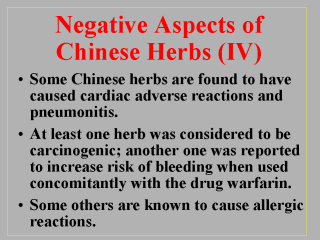| front |1 |2 |3 |4 |5 |6 |7 |8 |9 |10 |11 |12 |13 |14 |15 |16 |17 |18 |19 |20 |21 |22 |23 |review |
 |
Despite the fact
that some Chinese herbal medicines (CHM) are used specifically for treatment of certain
heart problems or pulmonary diseases (e.g., Fan, 1996; Liu and Deng, 1999; Molony, 1998;
Tierra, 1998), some others are found to have caused cardiac adverse reactions (Chan et
al., 1993; Kolev et al., 1996; Tai et al., 1992; Wong, 2001b) or
pneumonitis (Misushima et al., 1997). At least one Chinese herb was considered to be carcinogenic, after its use in high dosage was observed to result in a greater risk of urinary tract cancer (Nortier et al., 2000). Another CHM was reported to increase the risk of bleeding when used concomitantly with the drug warfarin (Stenton et al., 2001). Some CHM are also known to cause allergic reactions, including allergic contact dermatitis (Wong, 2002), generalized pruritic maculopapular eruption (Wong, 2000), and possibly Stevens-Johnson syndrome (Dega et al., 1996). In Hong Kong, most cases of serious poisoning are related to a handful of CHM used to treat arthritis, rheumatism, bruises, and fractures (Chan et al., 1993). These cases involved neurological, cardiovascular, or gastrointestinal signs and symptoms. A few of these CHM contained variable amounts of highly toxic alkaloids, including aconitine which can cause cardiovascular collapse. A few other cases involved anticholinergic poisoning from use of Chinese herbs that contained the belladonna alkaloids scopolamine or atropine. |